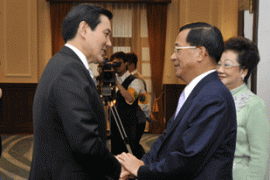Ma takes office as Taiwan president
New leader vows closer economic ties with China but says no unification talks.

| Ma v Chen on China ties | ||
|
Ma Ying-jeou – new president |
 |
Chen Shui-bian – former president
Introduced education policy that teaches history, geography, and culture from a Taiwan perspective
Promoted use of Hokkien and Hakka, Chinese dialects commonly used in Taiwan
Eliminated the name “China” from government companies and sought UN membership for island under the name Taiwan
Turned down Beijing‘s offer of cross-Taiwan Strait peace accord under the “one-China” framework, dismissing the idea as part of scheme by China to annex Taiwan
In contrast to the independence bent of Chen’s Democratic Progressive party, Ma’s Nationalist party or Kuomintang, has never formally renounced a desire for eventual unification with China.
But in a break with the Nationalist old guard, Ma has vowed not to negotiate with Beijing about unification during his term in office.
This could stretch to 2016 if he is re-elected to a second four-year term.
Chen leaves office after two four-year terms under the threat of being indicted in a high-profile corruption scandal that has already drawn in his wife.
Beijing regularly vilified Chen as trying to achieve Taiwan’s independence by stealth.
Taiwan split from China during a civil war in 1949 and although autonomously governed, the mainland maintains that reunification will take place eventually, by military force if necessary.
Chang Wu-yueh, a China expert with Taipei‘s Tamkang University, told The Associated Press that Ma was likely to stress the cultural and historical ties between Taiwan and the mainland.
That would represent a major departure from Chen, who de-emphasised Chinese history and culture in Taiwanese schools, eliminated the name “China” from a slew of government companies and sought UN membership for the island under the name Taiwan.
Boosting economic ties
Ma, Taipei‘s Harvard-educated former mayor, won 58 per cent of the vote in the March 22 elections.
His election platform was based on seeking to tie Taiwan‘s powerful but lagging economy more closely to China‘s economic boom.
He has proposed beginning direct commercial flights across the 160km-wide Taiwan Strait and opening Taiwan‘s doors to a massive influx of Chinese tourists.
He has also promised to work towards a peace treaty with Beijing, but has not provided details.
Reports in Taiwan suggest Ma will appeal for a resumption of high-level
dialogue that was suspended by China in 1995 in protest against a landmark US visit by Lee Teng-hui, who was then Taiwan‘s president.
